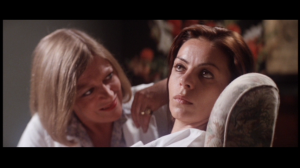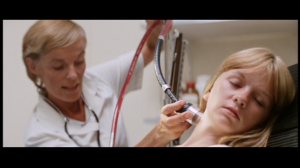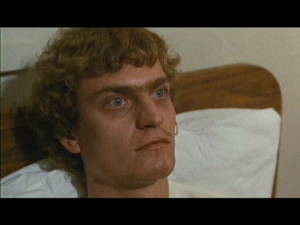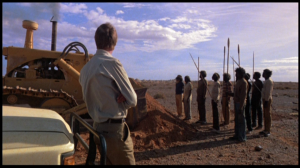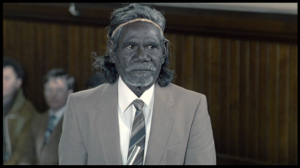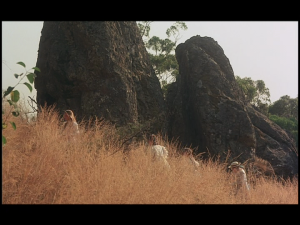To you and me, it would seem Miss Davis (Chantal Contouri) is just like any other ordinary person, although she is perhaps a little more well-off than most. She works hard, and has earned the extended vacation she’s about to take. Unfortunately her boyfriend Derek is unable to go with her, but she’s an independent woman of today and will enjoy her vacation nonetheless. But of course, she never makes it to her destination; on her way out the door she is kidnapped and taken to a remote complex in the Australian countryside where horrible things happen…
Unfortunately for The Brotherhood, Kate is a headstrong and independent woman, and converting her will not be an easy task. The higher-ups of the group are fighting about the best way to help her in changing her mind. Mrs. Barker (Shirley Cameron) favors an extremely aggressive approach, using hallucinatory drugs to achieve her goals. Dr. Fraser (David Hemmings) believes this tactic will be not only very expensive, but may also drive Kate crazy. Both of them try talking sense into Kate, showing her around the “farm” and introducing her to the “blood-cows” (human livestock) that are privileged enough to donate their life force to vampiric royalty. Is Kate strong enough to resist the her inherited Thirst?
I’ve seen Thirst three times now, and every time I’ve been impressed with it. It is a serious vampire movie that seriously critiques modern society, but I never felt like it was selling ideology. While films like Society and They Live tackle similar territory, they have a hell of a lot more laughs than Thirst does. Usually I’d say that’s a hefty nail in a film’s coffin, but director Rod Hardy really makes it work here. Perhaps part of the reason why it works so well is instead of a usual black and white, poor vs. rich situation, the main conflict is actually between rich folks themselves. This isn’t just a film about rich people literally sucking the life out of the lower classes, it’s also about indoctrinating other rich folks deemed worth to come to their side. That’s what makes this movie a little more interesting to me: it’s not really saying much to show that the aristocracy makes its living (and derives its pleasure) from the lower classes; it’s been that way for centuries. But exploring the infighting between the rich themselves, at least in terms of how the lower classes are treated, is less-covered and more interesting territory.
So, yes, Thirst has a lot to say, and I think it says it well. It also looks great; the special effects (well, okay, the blood) is super-duper, and for the most part not too in-your-face (though perhaps the shower scene is a little bit much… it also explains why I let the water run for a second before hopping in!). There are some genuinely frightening scenes as the good doctors push their psychological agenda on Kate. Watching her constantly tortured expression while also wondering what the hell is going on is a pretty good fright-cocktail, and Contouri does an excellent job of earning my empathy. I do think, though, Shirley Cameron’s Mrs. Barker outshines her with one of the most gleefully evil portrayals I’ve ever seen; a real rich bitch I took an immense pleasure in hating!
